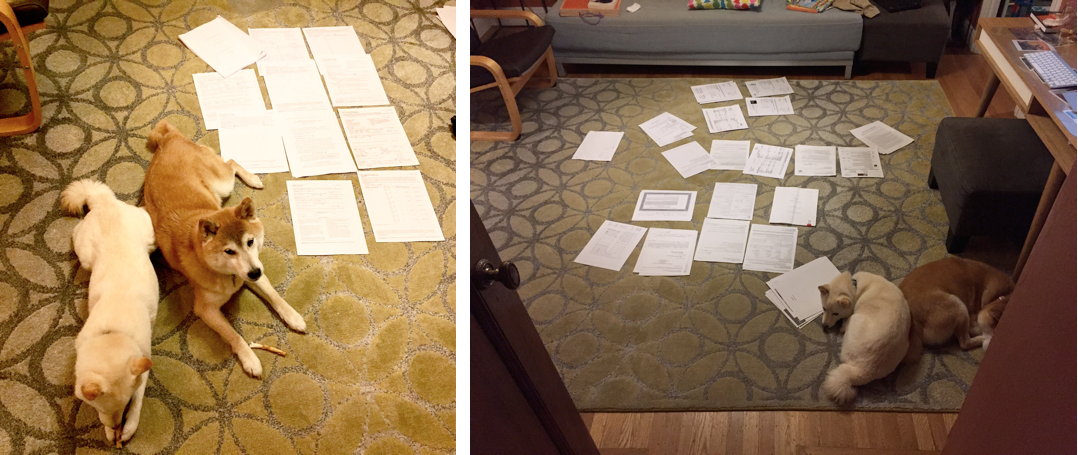I'm living the C-Suite dream over here. I'm a CEO, people. Sitting atop my ramen empire, printing money, golden parachute in place if the Board of Directors pushes me out of the fast casual airplane. Damn, I'm living the life, you know?
OK, reader, I'll level with you. I wouldn't want you to give you the wrong idea. After all, Ramen Chemistry is committed to the transparency of the experience. So let me try again. Yes, I am a CEO. No, I do not have an empire, I have a (very busy) kiosk. If by "printing money" you mean "signing checks," then yes, I am printing a lot of money. Obviously, there is no golden parachute, although as Chairman of the Board, my risk of dismissal is relatively low. And when I say "I'm living the life," what I really mean is "I have no life."
Like really, I have no life. I think I only leave the house to go to and from preschool. I've been subsisting for weeks on a four-pound bag of M&Ms from Costco. My existence is just an endless cycle of putting out little fires, office work, childcare, and power naps. All from the isolated dual-screen comfort of my home office! I don't even have time to go to work. Who has two hours to spend in bus transit everyday?
Shiba Ramen. I don't actually come here very much. Gravitational forces keep me pulled toward the home office, pretty much all the time.
Living From One Power Nap to the Next
Daily routine goes something like this: I wake up. I dress and feed a three-year-old child, make said child's lunch and collect sharing toys. We go to preschool. I return home, make coffee and eat cereal, put on my lawyer hat, bear down, and spend the whole day drafting briefs, stipulations, emails, and meticulously recording my activities in six-minute increments. Possibly, I take a power nap. Late in the afternoon, I return to preschool and collect a napless and ecstatically needy toddler, who I then entertain/hold at bay for several hours, while trying to finish whatever lawyer work still needs to be done, clean the house, make dinner, etc.
My wife, you see, has been working late in a hot new ramen shop almost every night for the past 3 months. When she gets home, beer is opened and we finally eat. The toddler is still awake, happily going about the business of watching shows and demanding snacks. At maybe 10, we finally put him to bed. Then I put on my CEO hat and do Shiba Ramen. At some point I probably eat ice cream. Or more cereal. Weekends aren't much different; the lawyer work is just replaced with childcare, vacuuming dog hair, and running errands for Shiba Ramen. Is it any wonder that I've taken too-frequent refuge in fast food, or that I bought myself a box of Lucky Charms (magically delicious!) as a completely transparent coping device? Actually, two boxes of Lucky Charms.
At Least We Can Still Enjoy Physics! A trip to one of our favorite places, the Lawrence Hall of Science at UC Berkeley, while mom was at work.
Running an Empire (With a Noticeable Limp)
I'm sure you've had the feeling at some point in your life that you are doing so many things that it's impossible to do any one of them well. That's where I am right now. There are certain things I can't avoid--my day job and childcare--those have to be handled before anything else can happen. A lawyer can't drop the ball for his clients (or his employer), and a dad can't give his kid short shrift during the middle of a huge life change, especially when mom has been devoured by the restaurant monster the two of you created instead of going in for the (admittedly more traditional) second human child.
Shiba Ramen gets whatever is left over at the end of the day. On many days, that isn't much. And there are plenty of Shiba things that, like my day job, can't be avoided. I've got to staff the restaurant, deal with employee issues, run payroll, and so on. So most of the time all I can manage is the bare minimum; whatever has to be done to keep the business functioning seamlessly. The fun stuff, the stuff directed to growing the business--marketing, social media, writing a blog--necessarily takes a back seat. But when you're trying to pull off this kind of juggling act, knowing your limits is essential. If something isn't urgent, it waits.
Solace comes from the fact that all this is consistent with expectations, more or less. We knew opening a restaurant would be pretty brutal, that Hiroko would be at the shop all the time, at least for a few months. Not that it's possible to be fully prepared for the effect of something like this on your day-to-day life. It definitely isn't. You just have to assume it's going to be painful, that the details will fill themselves in as the adventure unfolds, and that you'll adjust. Like by going part-time at work, which I actually did last month to create enough space in life for all the childcare I wasn't doing three months ago.
Action. The staff is coming together nicely.
The Future of the Ramen Barony
I don't mean to sound all doom-and-gloom. Far from it. Objectively things are going great. We've survived the worst perils of restaurant opening. Despite having our share of hiccups in the first six weeks, our concept has gotten a great reception in the local food press (East Bay Express, KQED Bay Area Bites, East Bay Monthly), we're putting out well over 200 bowls of ramen a day, quality control is improving, and there are tons of repeat customers. We seem to have navigated the worst of putting a functioning staff together and, although we're still bringing on and training some new folks, we're developing a great core of competent and motivated workers. We have almost twenty employees now, only two of whom were with us on Day One in December. Seems crazy for what is technically a "kiosk" in a food court, but that's actually what it takes to put out a serious volume of high-quality made-to-order ramen seven days a week, lunch and dinner. At least it is when a lot of people are still in training.
We're getting to the point where the right people are taking on positions of responsibility at Shiba Ramen, which means Hiroko can get out of the kitchen and spend her time living up to the only-half-joking title we've given her: Vice President of Product Development and Quality Control. She's also the company's CFO and, as I often tell people, she's more of a QuickBooks person anyway. And that's the point: as mom-and-pop as this whole enterprise seems today, this isn't a mom-and-pop business model. Shiba Ramen needs to be able to operate without either of us being in the store all the time. We can only go where we want to go with this business--multiple outlets over a broad geographic space--if other people can run the day-to-day.
Before that, though, I'll settle for some relief from changing diapers. I'm confident help is on the way.
Up next, I'll explain how we took our operations from their oh-so-tenuous December days to today's place of optimism.














